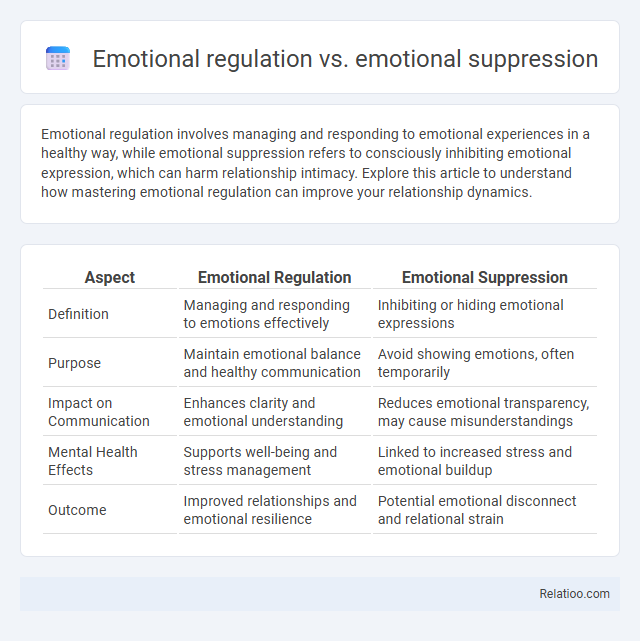Emotional regulation involves managing and responding to emotional experiences in a healthy way, while emotional suppression refers to consciously inhibiting emotional expression, which can harm relationship intimacy. Explore this article to understand how mastering emotional regulation can improve your relationship dynamics.
Table of Comparison
| Aspect | Emotional Regulation | Emotional Suppression |
|---|---|---|
| Definition | Managing and responding to emotions effectively | Inhibiting or hiding emotional expressions |
| Purpose | Maintain emotional balance and healthy communication | Avoid showing emotions, often temporarily |
| Impact on Communication | Enhances clarity and emotional understanding | Reduces emotional transparency, may cause misunderstandings |
| Mental Health Effects | Supports well-being and stress management | Linked to increased stress and emotional buildup |
| Outcome | Improved relationships and emotional resilience | Potential emotional disconnect and relational strain |
Understanding Emotional Regulation
Understanding emotional regulation involves recognizing how you manage and respond to your feelings in a healthy way, unlike emotional suppression which entails pushing emotions out of awareness and often worsening stress. Emotional regulation includes strategies like mindfulness and cognitive reappraisal that help maintain emotional balance and improve mental well-being. Mastering emotional regulation empowers your ability to navigate difficult situations and enhance emotional resilience effectively.
Defining Emotional Suppression
Emotional suppression involves consciously inhibiting the outward expression of emotions, often leading to increased physiological stress and decreased emotional awareness. Unlike emotional regulation, which entails managing and adapting emotional responses to fit situational demands, suppression ignores internal feelings and prevents healthy emotional processing. Effective emotional regulation promotes psychological well-being by balancing emotional experience and expression, whereas suppression can contribute to negative mental health outcomes.
Key Differences Between Regulation and Suppression
Emotional regulation involves consciously managing and responding to emotional experiences in adaptive ways, while emotional suppression refers to the deliberate inhibition of emotional expression, often leading to increased internal stress. Regulation supports mental health by promoting emotional awareness and constructive coping strategies, whereas suppression may result in negative psychological outcomes, including heightened anxiety and reduced emotional awareness. Key differences lie in their impact: regulation modifies emotional responses, enhancing well-being, whereas suppression masks emotions without addressing underlying feelings.
Psychological Impact of Emotional Regulation
Emotional regulation involves managing and responding to emotional experiences in a healthy way, promoting psychological well-being by reducing stress and enhancing resilience. In contrast, emotional suppression--consciously inhibiting emotional expression--often leads to increased physiological stress and negative mental health outcomes, such as anxiety and depression. Effective emotional regulation supports adaptive coping mechanisms, facilitating emotional awareness and self-control crucial for maintaining psychological balance.
Consequences of Emotional Suppression
Emotional regulation involves managing and responding to emotional experiences in a healthy way, while emotional suppression entails consciously inhibiting emotional expression, often leading to negative psychological consequences such as increased stress, anxiety, and reduced well-being. Unlike emotional regulation, emotional suppression disrupts your ability to process emotions effectively, resulting in heightened physiological arousal and impaired social functioning. Understanding these distinctions is crucial for developing healthier coping mechanisms that promote emotional resilience and mental health.
Benefits of Healthy Emotion Management
Healthy emotional regulation promotes well-being by helping you understand and express feelings constructively, reducing stress and improving relationships. In contrast, emotional suppression often leads to increased anxiety, physical health issues, and impaired social interactions by blocking natural emotional flow. Prioritizing emotional regulation enables better decision-making, resilience, and overall mental health, enhancing both personal and professional environments.
Strategies for Practicing Emotional Regulation
Emotional regulation involves consciously managing your emotions through strategies such as mindfulness, cognitive reappraisal, and deep breathing exercises to maintain psychological balance. Emotional suppression, by contrast, entails inhibiting emotional expression, which often leads to increased stress and negative mental health outcomes. Effective emotional regulation techniques empower you to process emotions constructively, enhancing resilience and well-being.
Common Myths About Emotion Suppression
Emotional regulation involves managing and responding to your emotions in a healthy way, while emotional suppression refers to consciously attempting to inhibit emotional expression, often leading to adverse psychological effects. Common myths about emotion suppression include beliefs that it helps avoid negative feelings or solves emotional problems, but research shows suppression can increase stress and reduce emotional well-being. Understanding the distinction between effective regulation and harmful suppression empowers you to develop healthier emotional strategies.
The Role of Culture in Emotion Expression
Cultural norms significantly shape how emotional regulation and emotional suppression are practiced, influencing which emotions are openly expressed or controlled. Emotional regulation involves managing emotions adaptively according to cultural expectations, while emotional suppression often entails inhibiting feelings deemed inappropriate by societal standards. Understanding the role of culture helps you navigate emotional expression effectively, respecting both personal well-being and cultural values.
Developing Emotional Intelligence for Well-being
Emotional regulation involves consciously managing and responding to emotions in a healthy way, fostering resilience and improved well-being. Emotional suppression, in contrast, refers to the unconscious or deliberate inhibition of emotional expression, often leading to increased stress and decreased psychological health. Developing emotional intelligence enhances emotional regulation by promoting self-awareness, empathy, and adaptive coping strategies, which are essential for sustaining mental and emotional well-being.

Infographic: Emotional regulation vs Emotional suppression
 relatioo.com
relatioo.com